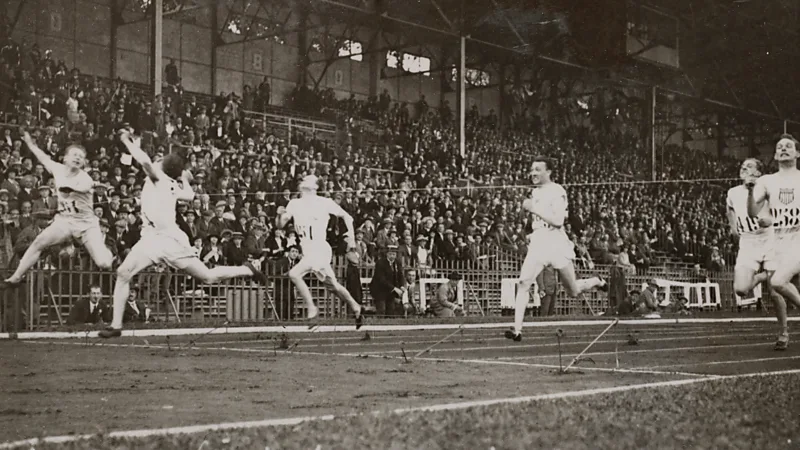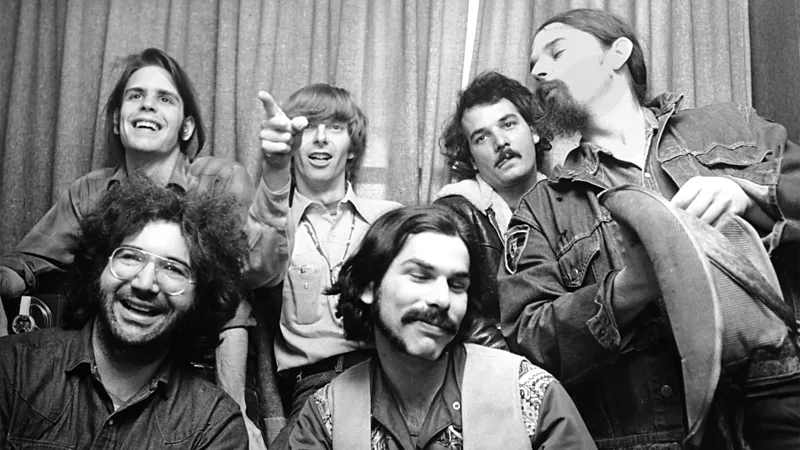'It's complete surrender' – Olympics hero Eric Liddell and the true story behind Chariots of Fire
Scottish athlete Eric Liddell won the 400m gold at the Paris Olympics on 11 July 1924 – but he's just as famous for a race he didn't run. In History looks at the real story behind the Chariots of Fire movie myth.

The son of Christian missionaries, Eric Liddell was born in China in 1902 and died there 43 years later in a Japanese internment camp. In between, he played for Scotland at rugby, won Olympic gold for Britain and inspired an Oscar-winning film about his athletic exploits many years later. After his spectacular early success, he spent the rest of his life working as a missionary even when it meant putting himself in danger. He died without ever meeting his youngest daughter. It was an extraordinary life, marked by faith, tragedy and courage.
At the age of five, Liddell returned from China with his parents to Scotland and he was sent away to the School for the Sons of Missionaries in London, later known as Eltham College. In 1920 he returned to Scotland to study at the University of Edinburgh. His outstanding potential as an athlete was spotted straight away, with the Glasgow Herald tipping him as a future British champion.
According to Liddell's university friend Prof Neil Campbell, his running style was unorthodox but not ungainly. Speaking to the BBC in 1984, he said: "He certainly ran very often with his head back. Now, people say, 'Well, how did he see where to go?' But you put your head back, you can still see perfectly well what's ahead of you. He used his arms pretty aggressively and he swayed a bit – at least that's what it looked from behind, like an express train."
A supremely talented sportsman, Liddell played seven times for Scotland's international rugby team between 1921 and 1923. However, training and competing at elite level in two sports was too much, so he chose to focus on athletics where he had established himself as one of the country's top runners. He was selected for the British squad for the 1924 Paris Olympics, where he was among the favourites to win in his strongest event, the 100m sprint.
But when the timetable for the Games was released, the 100m heats were on a Sunday and Eric Liddell dropped a stunning revelation. The Christian Sabbath was the Lord's Day and there was nothing in this world that could persuade him to run.
In the 1981 film Chariots of Fire, Liddell only learns the 100m heats will be held on a Sunday while boarding the boat to France. In reality, the schedule was known several months in advance. However, the movie's creative licence does reflect the real-life drama caused by his principled stance.
Looking back 60 years later, his friend and fellow athlete Greville Young said while those who knew Liddell were aware of his strong religious feelings, "it caused tremendous furore amongst many people, particularly with the newspapers and journalists".
Reporters hammered on the door of their student accommodation in Edinburgh, demanding to speak to Liddell. According to Young, "They were quite menacing almost and there were cries of, 'He's a traitor to his country'."
This didn't bother Liddell, according to his friend. "He just accepted these things, and I never remember him being upset. He said, 'It's just my belief. I don't criticise others about it, but I'm not going to run on the Sunday.'"
Liddell's decision meant he had to give up on his strongest event and switch his focus to the 400m. Instead of a straight dash to the finish line, this event required the stamina to maintain the pace around a full lap of the track, described at the time as the quarter-mile race.
Fellow Scottish athlete Tom Riddell said this longer distance exposed Liddell's idiosyncrasies, but he could still rely upon that electrifying pace. Speaking in the 1984 documentary, Eric Liddell: The Flying Scotsman, he said: "His running was great probably until he came to the last 200 yards where he really had to put in an effort. The head went back and the elbows came up, but when that happened the rest of the race could pretty well say 'we may as well give up'."
Liddell had some early success at the Paris Olympics, winning bronze in the 200m. Few believed he could improve on this in the longer distance final on Friday 11 July, 1924.
When the starting gun fired, he set off at a blistering speed, flashing past the halfway mark in 22.2 seconds. Throwing his head back in his distinctive style, he stretched his lead and ended up finishing 5m ahead of the chasing pack. The finishing time was 47.6 seconds. A rather breathless report in the next day's London Times described it as "probably the most dramatic race ever seen on a running track".
Tom Riddell told the BBC he had asked Liddell about his tactical approach: "In his own words he said, 'Well, when the gun goes, I go as fast as I can, and I trust to God that I'll have the strength to do the second half.' And I think he really did."
Homecoming hero
Liddell returned to Scotland as a hero. Huge crowds turned up to welcome him home and teenage fan-clubs were formed in his honour. However, the call of religious life proved stronger than his celebrity sporting career, and he decided to turn his back on all this adulation to become a missionary in China, just like his parents.
In addition to his religious duties, he worked as a science and sports teacher at the Anglo-Chinese College in Tianjin. In 1934 he married Florence Mackenzie, daughter of Canadian missionary parents, and they soon had two daughters. As time went on, life became increasingly challenging amid an ongoing civil war in the country. Things got even worse in 1937 when Japan invaded China. Conditions for foreigners slowly deteriorated, but Liddell insisted on carrying on his missionary work, moving to a more dangerous war-torn village.
When Japan first invaded China, its troops mostly left the Westerners there alone, but in 1941 the UK government advised all British nationals in China to leave. Liddell decided to stay put while Florence, now pregnant again, set sail with their two children for a safer life in Canada. He would never see them again.
His daughter Heather Liddell Ingram was aged three at the time. In a 2012 BBC documentary, she admitted she used to wonder why he didn't leave with his family. "It would have certainly made our lives better and I didn't really understand it until I started meeting people who had been children in the camp," she said. "There were something like 500 children in that camp without their parents, so the teachers and people like my dad were very important to them and I could see the big picture."
In 1943 he was interned at Weihsien, a Japanese internment camp for 1,500 prisoners in China's Shandong Province. In the camp, Liddell was affectionately known as Uncle Eric because of the energy he devoted to teaching children, organising sport activities and helping others. However, by the end of 1944 his fellow internees were noticing how he seemed more sluggish and tired than usual. Doctors diagnosed him with a brain tumour.
His friend and fellow missionary Annie Buchan was with him at the end. She told the makers of Eric Liddell: The Flying Scotsman: "Suddenly he said, 'Annie, it's complete surrender,' and that was his last breath. He went into a coma and never recovered." Liddell never wavered in his Christian faith. "He had been a man who was surrendering to God all his life through, and I don't believe that it cost him much to say 'complete surrender' because he knew where he was going." He died on 21 February 1945, just months before the camp was liberated at the end of World War Two.
Liddell's 400m Olympic triumph in happier times provides the uplifting climax to Chariots of Fire, the feel-good story of Liddell and his great rivalry with Harold Abrahams that won four Oscars at the 1982 Academy Awards. As well as best picture and best director, Vangelis's distinctive synthesizer soundtrack won best original score. More than 40 years on, the theme tune remains an instantly recognisable shorthand for everything athletic.
Ian Charleson, the Scottish actor who played Liddell, was also a graduate of the University of Edinburgh. Charleson was even younger than Liddell when he died in 1990. It was the first showbiz death in the UK openly attributed to Aids, and the 40-year-old's decision to make this public is said to have played a role in promoting awareness of the virus. Fellow actor Ian McKellen told the Daily Mail: "It is a tribute to Ian that he should ask for the cause of his death to be made public and it is the most marvellous offer of support that he could have given to other men and women all over the world suffering from the Aids virus."
While Liddell remains a Scottish hero, there are some who believe there's a case for calling him China's first Olympic champion, because he was born in that country. Either way, his accomplishments continue to inspire new generations a century later.
Those watching Chariots of Fire for the first time who did not know the story in advance must have felt devastated by the text that appears on screen at the very end: "Eric Liddell, Missionary. Died in Occupied China at the end of World War Two. All of Scotland mourned."
-bbc






